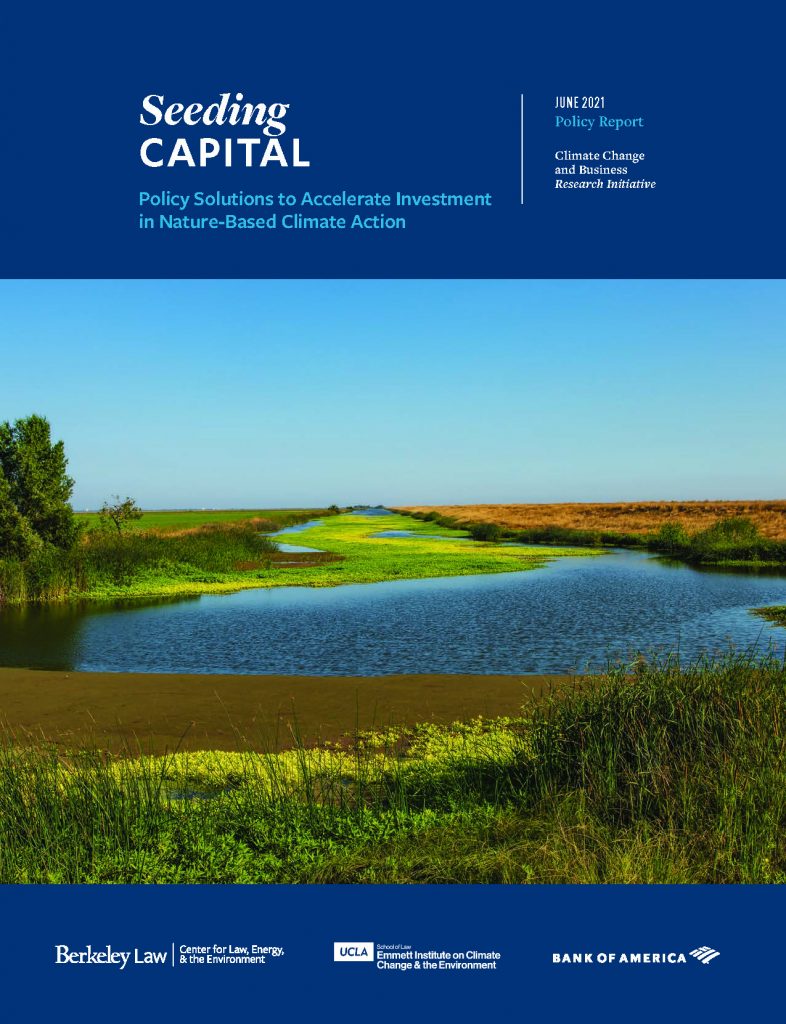The “explainer” channel Cheddar tackled why Los Angeles lost its vast streetcar network and debunks the conspiracy theory that General Motors destroyed it, featuring an interview with me:

Tonight on State of the Bay, we’ll talk to BART Board President Rebecca Saltzman and San Francisco Chronicle reporter Ricardo Cano about rebounding BART ridership numbers.
Then, novelist and columnist (and childhood friend of mine) Vanessa Hua joins us to talk about her new novel, “Forbidden City.”
Finally, we learn about the return of the surf competition The Mavericks to Half Moon Bay, with Elizabeth Cresson, Founder of Mavericks Ventures LLC and Paul Taublieb, Event Producer and Partner, Mavericks Ventures LLC.
What would you like to ask our guests? Post a comment here, tweet us @StateofBay, send an email to stateofthebay@kalw.org or leave a voicemail at (415) 580-0718.
Tune in tonight at 6pm PT on KALW 91.7 FM in the San Francisco Bay Area or stream live. You can also call 866-798-TALK with questions during the show.
KCET public television in Los Angeles covered the history of Los Angeles rail for the “Lost LA” series hosted by Nathan Masters, from the Red Cars to the modern Metro Rail system. Nathan interviewed me on the latter system, featured in the video below toward the end.
The episode is worth watching in full for an entertaining and informative recap of Red Car history. Nathan goes for a dive off the coast to try to find old streetcars sunk to create reefs and takes a ride on a preserved car at a rail museum.
I also wrote a companion article for KCET on this history, “From Rail to Roads and Back Again: The Rebirth of L.A.’s Public Transit,” based on my 2014 book Railtown (UC Press). While Los Angeles will never again have such a comprehensive rail transit system as with the Red Cars, the modern Metro Rail system is helping to fill important mobility gaps and helping to build a new city oriented around convenient rail service.

Tonight on State of the Bay at 6pm PT, we’ll learn more about San Francisco’s proposed vacancy tax on empty residential units that lawmakers and advocates hope will put more housing stock into the market. Joining us will be Lauren Hepler, housing reporter for the San Francisco Chronicle.
Then we will talk to self-professed comedy nerds and stand-up comedians Nina G and OJ Patterson, co-author of Bay Area Standup: A Humorous History. Did you know that Phyllis Diller, Mort Sahl and Father Guido Sarducci all got their start in the Bay Area?
Finally, just in time for Valentine’s Day, we’ll hear from Lucie Ebernova, the Dating Coach, who has ideas of how to navigate the wild world of meeting your true love.
What would you like to ask our guests? Post a comment here, tweet us @StateofBay, send an email to stateofthebay@kalw.org or leave a voicemail at (415) 580-0718.
Tune in tonight at 6pm PT on KALW 91.7 FM in the San Francisco Bay Area or stream live. You can also call 866-798-TALK with questions during the show.
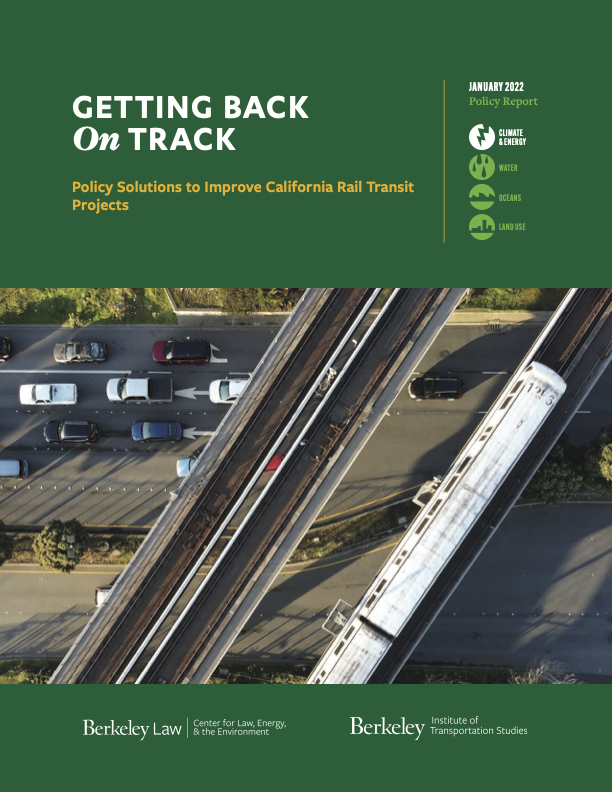
I’m pleased to co-author a new study released today by the Center for Law, Energy and the Environment (CLEE) at UC Berkeley Law that identifies the primary factors underlying cost and schedule overruns for rail transit construction and presents policy recommendations to overcome key barriers.
Improving rail transit delivery is critical for meeting climate and equity goals, given that the transportation sector contributes the majority of the state’s total greenhouse gas emissions. Since the bulk of these emissions come from private automobile travel, rail transit—from heavy-rail subways to overhead-powered trolleys—offers low-emission and low-cost commuting and travel options across income levels.
However, in California and throughout the United States, rail transit infrastructure projects have long suffered from cost overruns and deployment delays that reduce the value of investment and erode public trust. These state and nation-wide projects lag international peers.
For example, completed U.S. heavy rail projects (with trains powered from below via an electric “third rail”) cost more than twice as much on average than their European, Canadian, and Australian counterparts, while U.S. light rail projects (powered by overhead electric lines) cost around 15 percent more than similar projects in Europe, Canada, and Australia. In the United States, different governance authorities hold veto power over multiple decision points, and lack of alignment between these authorities can derail regionally-crucial projects.
Some of the largest and highest-profile California projects, such as the second phase of the Silicon Valley Bay Area Rapid Transit (BART) extension into San José, are particularly slow and expensive. How can California deliver high-quality rail transit projects while keeping on budget and on schedule? Although transit ridership has fallen during the COVID-19 pandemic, ridership is beginning to rebound and transit agencies are committing billions to new infrastructure.
With funding from California SB 1 research dollars through the UC Berkeley Institute of Transportation Studies, CLEE analyzed national and international construction trends and assessed five California rail case studies that offer examples of delivery issues and methods to address them. Common challenges included lack of megaproject management capacity and expertise; project design and scope creep; lack of agency coordination; inefficient procurement and contracting methods; and need for excessive stakeholder outreach.
The five case studies included rail transit projects in Los Angeles, San Diego, San Francisco, and San José, as well as California’s statewide high-speed rail project (which is not a traditional intracity rail line but will be vital to state efforts to reduce vehicle travel). Drawing on the lessons learned from these five cases, CLEE recommends state, regional and local transit leaders consider:
- Forming regional collaboratives to house permanent expertise not tied to any individual local project, with staff available to consult with or contract out to projects when needed. Such a collaborative could benefit projects like the Bay Area Rapid Transit Berryessa Extension, where multi-agency oversight of different project elements required dedicated coordination and communication.
- Creating a statewide office to provide dedicated staff support/ technical assistance to facilitate coordination among local and regional agencies or offer additional funding to agencies that provide detailed plans for addressing any in-house staffing needs, as applicable. For example, the San Francisco Central Subway involved complex construction in a high-density residential and commercial district with significant overruns and delays, in part because agency staff had less megaproject experience than contractor teams. California High-Speed Rail similarly struggled with sufficient in-house capacity, particularly during its early stages.
- Using project procurement and delivery methods that includes early contractor involvement to ensure the total cost of building expensive projects in dense, complex areas is identified before construction begins. For example, the San Diego Mid-Coast Corridor Trolley successfully utilized the construction manager/general contractor or construction manager-at-risk contracting method (CMGC/CMAR), in which the project owner engages a designer and a construction manager separately during the design phase, and the owner and construction manager negotiate a guaranteed maximum price for construction prior to design completion before starting the build phase. This method helped ensure that this relatively pricey project stayed on budget.
- Legislatively granting master permitting authority to transit agencies with priority rail transit projects (including engineering, street closure, and similar project completion-critical permits) to reduce delays and costs imposed by local governments or large or powerful stakeholders along the route. For example, Los Angeles Purple Line Section 1 leaders coordinated with local governments to align expectations about restricted construction times and locations, as local governments held permitting authority over the transit agency.
- Avoiding the addition of significant, non-essential betterments and limiting bespoke design for extraneous station elements (e.g., complex facades), particularly after the design stage. Multiple case study projects suffered from expensive, over-designed project elements to appease stakeholders along the route with effective veto power and other leverage. Determining who will pay for these modifications is a crucial decision point that can push a transit project over budget and behind schedule, if not appropriately managed. State and federal leaders could condition funding on avoiding outcomes that delay a project or place unreasonable cost expectations on the agency and its contractors.
You can read the full report as well as a short policy brief.
Register for a free webinar on Thursday, January 27 at 10:00am Pacific time to learn about the report’s top findings with an expert panel including:
- Hasan Ikhrata, Executive Director of the San Diego Association of Governments (SANDAG)
- Brian Kelly, CEO of the California High-Speed Rail Authority
- Therese McMillan, Executive Director of the Metropolitan Transportation Commission
Thanks to my report co-authors Katie Segal, Ted Lamm and Michael Maroulis.

It’s a double-shot of shows on KALW 91.7 FM today, my last two of the year. First, this morning on Your Call’s One Planet Series at 10am PT, we’ll discuss how climate science is being politicized in schools with investigative journalist Katie Worth, author of the riveting new book, Miseducation: How Climate Change Is Taught in America.
In the second half of the show, we’ll cover the mental health impacts of air pollution with reporter Kristina Marusic.
Then tonight at 6pm PT, I’ll be co-hosting State of the Bay to assess recent decisions rejecting or delaying housing projects by the San Francisco Board of Supervisors. UC Davis Professor of Law Chris Elmendorf will help us understand the statewide legal implications of these anti-housing decisions, in particular the recent delay of a 500-unit housing development near BART.
Then we’ll discuss the state of the Bay Area’s “slow streets” movement, which close streets to most traffic for improved pedestrian and bike safety. What do you think about these measures? Ask our guests Eillie Anzilotti of the SFMTA and community planner Leah Chambers.
Finally, you’ll hear my interview with with Phil Ginsburg, General Manager of the San Francisco Recreation and Parks Department, who will discuss some of the holiday festivities available in the city’s public spaces.
Tune in at 91.7 FM in the San Francisco Bay Area or stream live at 10am PT for Your Call and then again at 6pm PT for State of the Bay. What comments or questions do you have for these guests? Call 866-798-TALK to join the conversation!
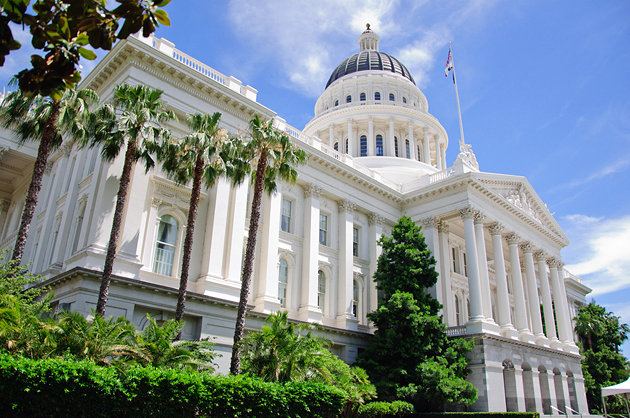
Earlier this month, Governor Newsom signed two significant housing bills — one to end single-unit zoning in urban areas across California and one to allow local governments to upzone parcels near transit to up to 10 units. These new laws could start to make a dent in the state’s multi-million unit housing shortage. But how much?
First and foremost, SB 9 (Atkins) would allow homeowners to convert their house into a duplex, or split their lot and build two units on each lot, allowing up to four units per original parcel — all with streamlined local approval. In short, it ends single-unit zoning in urbanized and transit-rich areas across the state.
For context, the state has roughly 7.5 million single-unit-zoned parcels, and nearly two-thirds of residential land in the state is reserved exclusively for this type of single-unit zoning.
I recently hosted David Garcia from UC Berkeley’s Terner Center on Housing Innovation on KALW’s Your Call to discuss the bill, and his center found that SB 9 could enable the creation of over 700,000 new homes that would otherwise not be market feasible. Given that some estimates peg the state’s housing shortage at 3.5 million, an additional 700,000 units would be a sizeable contribution.
Yet these changes won’t happen overnight. Property owners would need to decide to convert their homes or split their lots, a process which could take years to unfold statewide. Still, given the history of racial exclusion associated with single-unit zoning, coupled with the need to boost housing anywhere we can, and especially in high-income, transit-rich communities, this bill is a welcome step in the right direction.
The second bill, SB 10 (Wiener), is a voluntary opt-in for local governments wishing to rezone parcels for up to 10 units of housing near transit. It allows them to do so without undergoing environmental review.
This bill is less likely to have a big impact on housing production, simply because many local governments and their homeowner constituents are hostile to new apartment buildings. However, as the state tightens the requirements for local governments to provide housing for residents of all incomes, they may be forced to invoke this provision. And in the meantime, local governments that do want to see more dense development (and have the market conditions to enable it) will be able to utilize this law.
Notably, wealthy anti-development interests are already challenging this bill. The Los Angeles-based AIDS Healthcare Foundation, run by a longtime development opponent with personal beef against the author of SB 9, filed a lawsuit claiming that the new law is unconstitutional, because it allows local governments to override voter-approved initiatives restricting development with a supermajority vote. The nonprofit Planning and Conservation League also opposed the bill on similar grounds.
Given the statewide importance of housing production, this lawsuit is unlikely to succeed. But homeowners from some of the wealthiest communities around the state are also mobilizing to place before the voters a constitutional amendment restricting what state policy makers can do to boost housing over local objections.
The ballot measure is also unlikely to succeed given the pro-housing politics of the electorate (many of whom are renters and housing insecure). But it’s yet another example of wealthy interests fighting to preserve the exclusivity of their neighborhoods and maintain their inflated property values, at the expense of the less fortunate.
In the meantime, the real work to boost housing across the state will continue in the legislature. That means more legislation to allow apartment buildings near transit (particularly in high-income areas), streamlining approvals for infill projects, and reducing the overall cost of housing construction.
But for now, 2021 was definitely a year of progress on the housing front, with much more to be done.
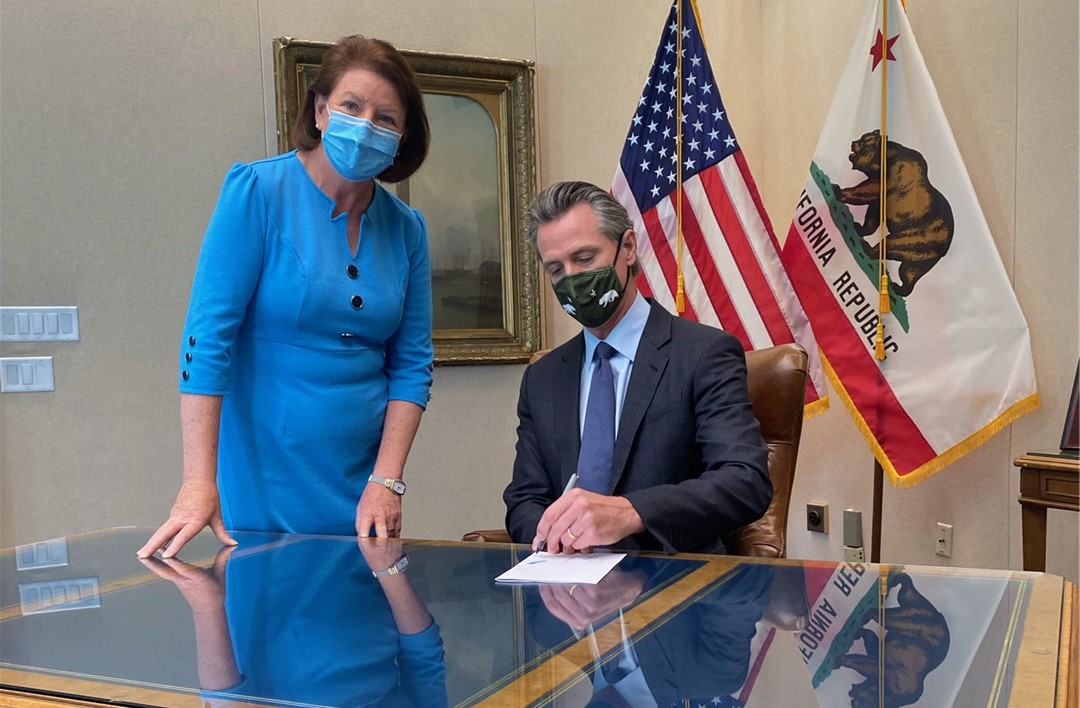
On tonight’s State of the Bay on KALW at 6pm PT, we’ll get an update on a few of the more consequential housing and labor bills crossing Governor Newsom’s desk with Emily Hoeven of CalMatters.
Plus, we’ll talk to Oakland-based activist Michelle MiJung Kim about her new book, The Wake Up: Closing the Gap Between Good Intentions and Real Change.
Finally, we’ll find out where YOU can join a march in support of reproductive rights from Sophia Andary, co-founder of the San Francisco Women’s March.
What would you like to ask our guests? Post a comment here, tweet us @StateofBay, send an email to stateofthebay@kalw.org or leave a voicemail at (415) 580-0718.
Tune in tonight at 6pm PT on KALW 91.7 FM in the San Francisco Bay Area or stream live. You can also call 866-798-TALK with questions during the show!

On tonight’s State of the Bay, we’ll ask: can Oakland keep the A’s? The major league baseball team owners hope to build a stadium on the waterfront, but some local employers worry it would harm the maritime economy at the port of Oakland. And what would happen to the current coliseum site?
Joining us to discuss will be:
- Dave Kaval, President of the Oakland A’s
- Mike Jacob, General Counsel for the Pacific Merchant Shipping Association
- Ray Bobbitt, Founder of the African-American Sports Entertainment Group
With a prerecorded statement by Oakland Councilmember Rebecca Kaplan.
Plus Grace Won talks with Tienlon Ho about her new cookbook, Mr. Jiu’s in Chinatown.
Tune in tonight at 6pm PT on KALW 91.7 FM in the San Francisco Bay Area or stream live.
What would you like to ask our guests? Post a comment, tweet us @StateofBay or send an email or voicemail to StateofBay@gmail.com. You can call 866-798-TALK with questions during the show!
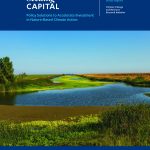
New UC Berkeley/UCLA Law report discusses policy solutions to accelerate investment in nature-based climate solutions in California. Register for a free webinar on Wednesday, June 16 from 10:00 AM to 11:00 AM Pacific Time with an expert panel to learn about the top findings.
This post is co-authored by Katie Segal and Ted Lamm.
Some of the most promising, cost-effective climate change solutions are in our own backyards. Trees, plants, soils, and ecosystems like wetlands can store and ultimately bury carbon, helping California and other jurisdictions achieve the “negative emissions” needed to meet long-term carbon neutrality goals.
These nature-based solutions also can reduce emissions from the land sector, such as emissions from agricultural practices. In addition, they can generate significant benefits beyond storing carbon, such as cleaning water, enriching biodiversity, providing more equitable access to urban green spaces, improving public health outcomes, and creating opportunities for COVID-19 economic recovery.
Yet nature-based climate solutions can be difficult to deploy because of various funding and financing barriers, despite the potential for reliable returns for a range of stakeholders. Resource managers and landowners may have high-quality projects in mind—from sustainable forest and vegetation management to urban greening—but struggle to connect with the right financing or funding pathways to development. Similarly, investors may wish to direct resources toward environmentally beneficial projects but lack sufficient information to identify best-fit vehicles and model returns.
Specific barriers to investment include failure of markets to recognize the benefits of nature-based carbon sequestration, lack of adequate data and metrics to inform investment decisions, and misalignment between project structures, public processes, and investment needs. As a result, despite rapidly growing understanding of the need to fund nature-based climate and resilience projects, experts have identified a biodiversity funding gap in the hundreds of billions of dollars.
A new report released today by UC Berkeley’s Center for Law, Energy and the Environment (CLEE) and the UCLA Law Emmett Institute on Climate Change and the Environment, Seeding Capital, proposes several policy solutions and innovations to tackle these challenges, including:
- Aligning nature-based investment products with existing international standards and labels
- Leveraging California Environmental Quality Act (CEQA) mitigation to fund projects on natural and working lands
- Standardizing accounting practices for measuring greenhouse gas impacts, environmental impacts, and community impacts
- Conducting advance planning and permitting for multiple potential projects to create “portfolios” for grantors and investors to finance
The report is sponsored by Bank of America and informed by an expert stakeholder convening facilitated by the law schools. Ultimately, implementing these solutions will require consistent and strategic alignment among various sectors, including financial leaders, state and local leaders, philanthropy, and various utility districts, among others.
To discuss the report’s findings and recommendations to bolster investment in nature-based solutions, Berkeley and UCLA Law will host a free webinar on Wednesday, June 16 from 10:00 AM to 11:00 AM Pacific Time with an expert panel, including:
- Newsha Ajami – Director of Urban Water Policy and Senior Research Scholar at Stanford Woods Institute for the Environment
- Amanda Hansen – Deputy Secretary for Climate Change at the California Natural Resources Agency
- Zach Knight – CEO and Co-Founder of Blue Forest Conservation
You can RSVP for the webinar here.
Download the report here.

